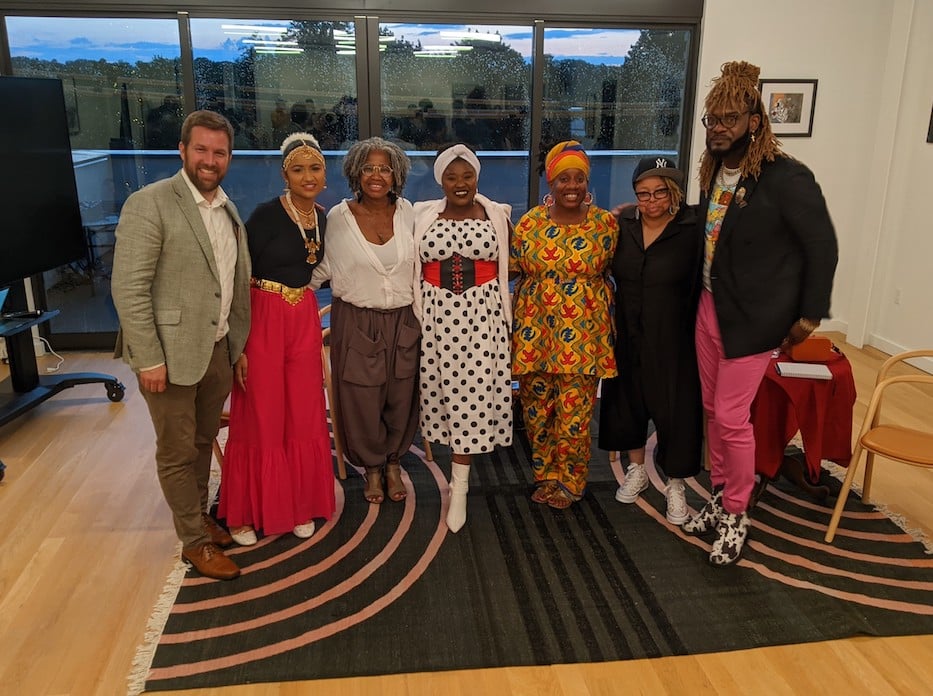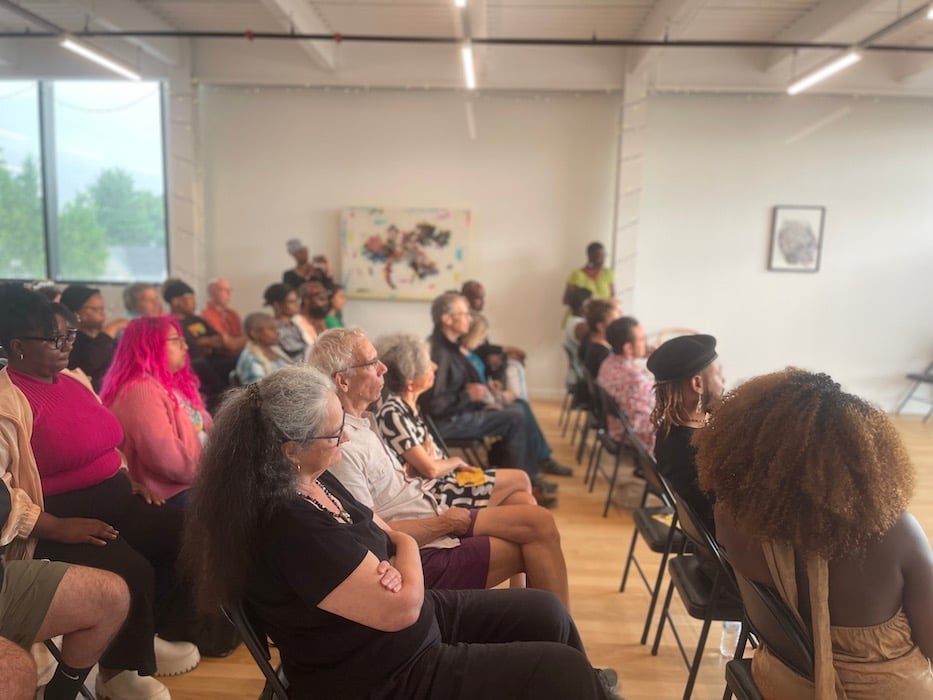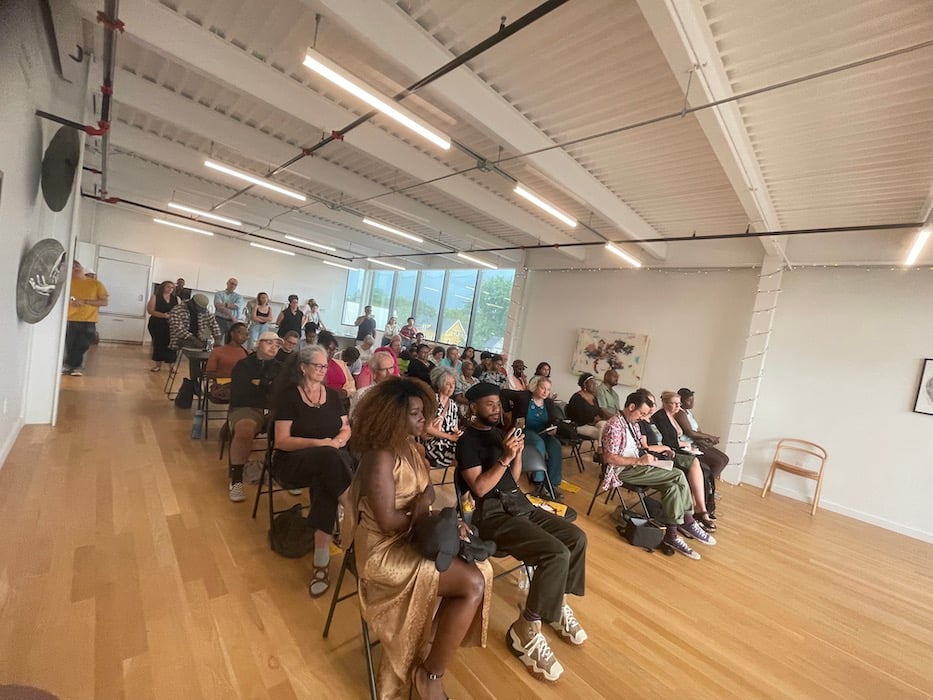
From left to right: Charlie Rich, Rania Das, IfeMichelle Gardin, Thabisa Rich, Dr. Hanan Hameen-Diop, Kim Weston and Malakhi Eason. Lisa Kaston Photos.
It was just past 6 p.m. on a Friday night, and the third floor of NXTHVN buzzed with electricity. Attendees nibbled on food from RAWA and Sanctuary Kitchen, chatter rising through the space. Across the walls, work from New Haven based artists peeked out, as if the pieces were saying hello. The event hadn’t even started, and already its creator was conjuring cultural connections.
That was the scene last Friday, as the Rich Arts Collective (RAC) held a panel discussion and launch party at the 169 Henry St. arts incubator in New Haven’s Dixwell neighborhood. Founded by South African singer/songwriter Thabisa Rich, the collective seeks to bring people together through multimedia arts and cultural programming, with the belief that the arts can be a cultural bridge. Roughly 60 people attended.
Rich, who is also the board president at CT Folk and community outreach coordinator for the city’s Department of Arts, Culture and Tourism, is living proof of that philosophy. After moving to New Haven with her husband, Charlie, several years ago, she has worked to bring the community together through her work, whether it is on the New Haven Green or behind the scenes at City Hall.
“We want to lift the voices of those that are not always heard,” said Charlie Rich, who sits on the collective’s board. He noted that as people take care of their families and hold down jobs, time does not always allow for conversations about deep issues. “We want to raise some of these questions here with you—to take a deeper dive into such topics as tonight’s focus of connecting community through the arts.”

The collective has received support from the city’s Neighborhood Cultural Vitality Grant Program, first awarded in October of last year, as well as NXTHVN and the Westville Village Renaissance Alliance (WVRA) among others. Friday, that commitment to artmaking was on full display in the room even before the panel began, with the work of Connecticut-based artists Faustin Adeniran, Jennifer Rae, Robbin D. Benefield, and Akosua.
It came sharply into focus as Charlie Rich introduced Rania Das, a student of Bharatanatyam, or classical Indian dance, and a rising sophomore at the Hopkins School.
Das gave a riveting performance, gracefully moving her body as she dipped and reached upward in concert with the melodic music. She showed off an expertise in Bharatanatyam with a fluidity and lyricism that can only come from years of studied practice.
Before leaving the room-turned-stage, she said she feels fortunate to have had the opportunity to learn an art form that has been passed down from generations. It has helped her find a passion that also keeps her connected to her parents’ homeland and her roots in India.
Thabisa Rich then took to the stage to better familiarize attendees with the Rich Arts Collective. The organization’s stated mission is to create cultural experiences that impact the greater New Haven community positively through music, art and conversation with the intention to inform, educate and entertain. The collective also centers a focus on the African diaspora.
Rich explained that when she graduated from high school in her birthplace of Kwazakhele, a township in South Africa, her grandfather urged her to get out, to leave the only home she knew. She soon realized that he was not trying to get rid of her—he wanted her to experience a world much bigger than her township, which had high poverty and little chance for upward mobility.
The advice was life-changing, she said. It set her on a journey to better understand the communities in which she lives. She has since grown a passion for connecting her neighbors, in celebration of their diversity and rich cultural heritages. In that way, she went on, “Rich Arts Collective is meant to be a home for everyone. It is meant to be a hub that you are going to build with me.”

Outside, a bout of heavy rain seemed to emphasize Thabisa’s spirited message. As the clouds parted and early evening sunlight filled the room, the artist introduced a panel that included Das, Kulturally LIT Founder IfeMichelle Gardin, dancer and Artsucation Academy Network Founder Dr. Hanan Hameen-Diop, and photographer and educator Kim Weston.
Malakhi RL Eason II, most recently director of programming and community impact at the International Festival of Arts & Ideas, moderated this discussion. Eason, who also uses the sobriquet "Dr. Kreative," is the owner, creator and chief executive officer (CEO) of Eason Kreative Agency, LLC.
After reading definitions of “culture” and “vibrant,” Eason asked the audience to shout out words that come to mind when one thinks of the two. As suggestions bubbled up from attendees, he turned to panelists, and asked each why their voices are so important in the cultural landscape of New Haven.
Weston, an award-winning photographer and founder of Wábi Gallery, pointed to her work showcasing both emerging and established artists—particularly artists of color— while mentoring young people through her FOCUS Fellowship Program. She explained that her purchase of a downtown New Haven property was as much for her as it was to demonstrate to fellow Black and Indigenous creatives that they can also own downtown properties. They do not have to limit themselves to buying residences in less affluent areas of the city, she said.
“Knowledge is something that needs to be shared—and across generations,” she later added. “If we can keep that communication going, we can all benefit from each other. We need to put our egos aside and listen to newer generations. Get out of our silos! Collectively, we can make this place more vibrant.”
Hameen-Diop, a founding member of the Juneteenth Coalition of Greater New Haven, told the audience that her family came to New Haven via the Great Migration. As the “product” of a jazz musician and an award-winning film-maker, she grew up surrounded by Black scholars who were also family friends. It informed her interest in international arts and education, which has taken her from dance classrooms at Neighborhood Music School to her studies and cross-cultural work in Senegal.
The youngest member of the panel, Das told the audience that she was glad to be included—and to bring her perspective to the conversation. As a young New Havener, she said, she sees the city’s potential as a cultural “melting pot,” but is also aware of how creative and cultural siloes, social media, and the city’s segregated landscape can get in the way. Already active in civic and political engagement, she said she’s happy to celebrate New Haven’s vibrant diversity through art, culture and food.
Jumping off from where Das had concluded, Gardin described herself as the elder on the panel —and explained that in order to look forward, one also has to look back. That is why her family background is so important to her, including those that experienced extreme discrimination in the Jim Crow South, and became part of the Great Migration.
This background informs who Gardin is today, and nurtures her legacy of community leadership. From the time she attended Bowen-Peters School of Dance to her management of Unique Boutique, New Haven’s first Black beauty supply store, Gardin has been involved in promoting the arts and expanding cultural awareness. It’s what helped her launch and grow Kulturally LIT and the Elm City LIT Fest, a celebration in the spirit of the Harlem Renaissance that features literature and literary artists of the African Diaspora from Connecticut and beyond.
“If anyone knows me, it’s all about collaboration,” she said. “I started LIT Fest with this in mind. Think collaboratively! Work collaboratively!”
“This country had Indigenous Americans before everyone else,” she later added. “Everyone has some heritage from elsewhere. We can all learn from each other.”
“How do we get people and organizations to come together?” Eason followed up. And later: “How can global immigrants and locally-raised folks build culture together to make an impact on their community?”
Hameen-Diop advised young people to reach out and ask someone to be their mentor. That is what she did, she said, and it served her very well. Every year, she now takes time to honor the elders in the community who have helped raise her and so many of New Haven’s young people.
She also called for a shift in the community’s collective mindset, noting the importance of listening to all members of a community, across generations. Through her work in New Haven and New York as well as in Senegal, Ghana and Cuba, she realized that “they’re not being taught about us, and we’re not being taught about them,” she said.
“We need to share our resources, come together and drop our egos,” she said.
Lisa Kaston has had a career in nonprofit administration, most recently serving on several non-profit boards, including as president of CT Folk. She continues to have a passion for celebrating community through our diverse arts and culture, and greatly appreciates the work of the Rich Arts Collective, as well as of the many other community programs and residents.